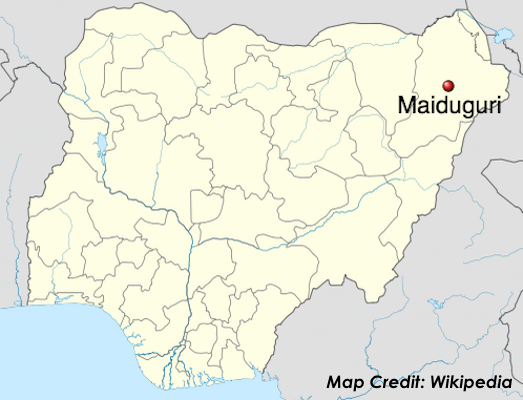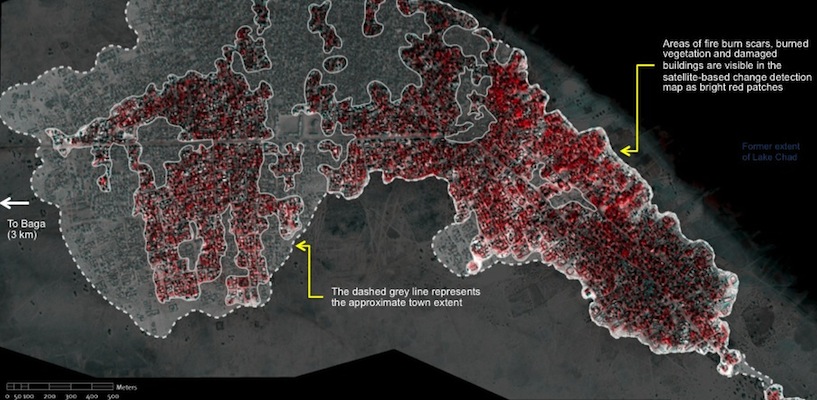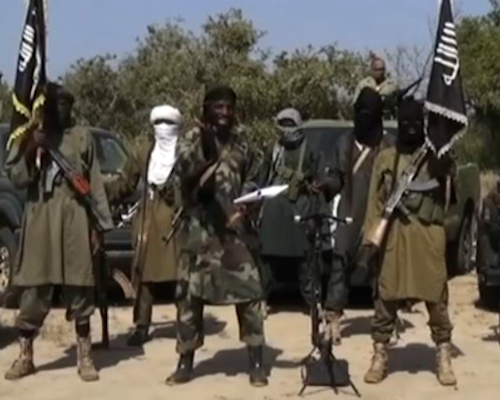Nigeria’s Boko Haram insurgency has spent the past month carefully picking off smaller military bases in northeastern Borno state — increasing their supply of weapons, demoralizing the armed forces, and reducing the chances of reinforcements arriving when the group turns toward a bigger prize. That prize is Maiduguri, the Borno state capital and a city of two million where the organization got its start, and the road is now — quite literally — open to it. Unsurprisingly, Boko Haram appears to have launched a concerted offensive to take the city.
Complementing Boko Haram’s manipulative strategy of minimizing world attention on their operations (full story➚), the group waited to start their offensive against Maiduguri until day after President Goodluck Jonathan’s recent re-election campaign rally there. That timing likely created maximal local terror, with the least resistance, but without attracting as much attention as another group might have sought.
Most groups probably would have launched a coordinated offensive on the city during the rally to maximize propaganda value. Indeed, four years and three months earlier, in October 2010, a very different and much older Nigerian terrorist organization — the southern Movement for the Emancipation of the Niger Delta (MEND) — dramatically staged a car bomb attack in the middle of a campaign rally in Abuja, the federal capital of Nigeria, almost in front of President Jonathan himself.
Even back in 2010 (see previous link), Boko Haram itself was known to bomb campaign rallies. Some four years later, they didn’t they hit Maiduguri while President Jonathan was present. Instead, the group waited to attack one day later. It’s entirely possible that this delay was the strategically and tactically superior move.
Boko Haram’s commanders would have known that security — and media coverage — would be substantially heightened while the president was physically in the city. By waiting a day and not attacking the city while the President of Nigeria was present, there was not nearly as much firepower present — or cameras to put it on the evening news in the United States.
An early edition of the BBC report (since revised, but I saved the text beforehand) tells the story of what happened next:
One resident on the outskirts of the town told the BBC that “hundreds of thousands of people” were fleeing and that the military was keeping a low profile.
“Only prayers will save us now, not the military,” she said, pointing out that the town’s defences now depended on civilian volunteers who had formed to repel the militant threat.
The attack was turned back after sustained counter-assault by federal troops, local defense militias, and the air force, but the assault on Maiduguri provided a distraction while Boko Haram seized the town of Monguno and sent federal troops there packing:
Militants also reportedly attacked Monguno, 140km (86 miles) north of Maiduguri.
Security sources told Reuters the army there was being overwhelmed, with houses set on fire.
A journalist in Maiduguri told the BBC that fleeing soldiers from Monguno were now arriving at the barracks in in Maiduguri.
Monguno fell this past weekend after about a week of attacks.
The attack on Maiduguri the previous weekend also probably tested the current defenses and deployments in the city ahead of the full-scale offensive, which began this past weekend.
Militants from the Islamist Boko Haram group began attacking Nigeria’s major northeastern city of Maiduguri shortly after midnight, residents told FRANCE 24 on Sunday, in an alarming escalation of violence ahead of a critical general election.
Explosions and gunfire erupted on the outskirts of the city in the middle of the night, marking the start of a major attack, according to Maiduguri residents. The sound of constant shelling could be heard from the Njimtilo area, about 20 kilometres away from the city, until around 11am local time.
More:
Boko Haram fighters stormed the northeastern Nigerian city of Maiduguri on Saturday, sparking a running battle with Nigerian troops for control of the strategically crucial Borno state capital.
Islamic extremists attacked Maiduguri, the biggest city in northeast Nigeria from four fronts overnight with the crescendo of warfare – booming cannon and whooshing rockets – continuing Sunday, witnesses said.
Now, we wait to see whether Boko Haram can take and hold the city against the Nigerian military and an impending arrival of multinational forces from the African Union.
Without intervention, it seems almost inevitable at this point that the federal government will allow Maiduguri to fall.










